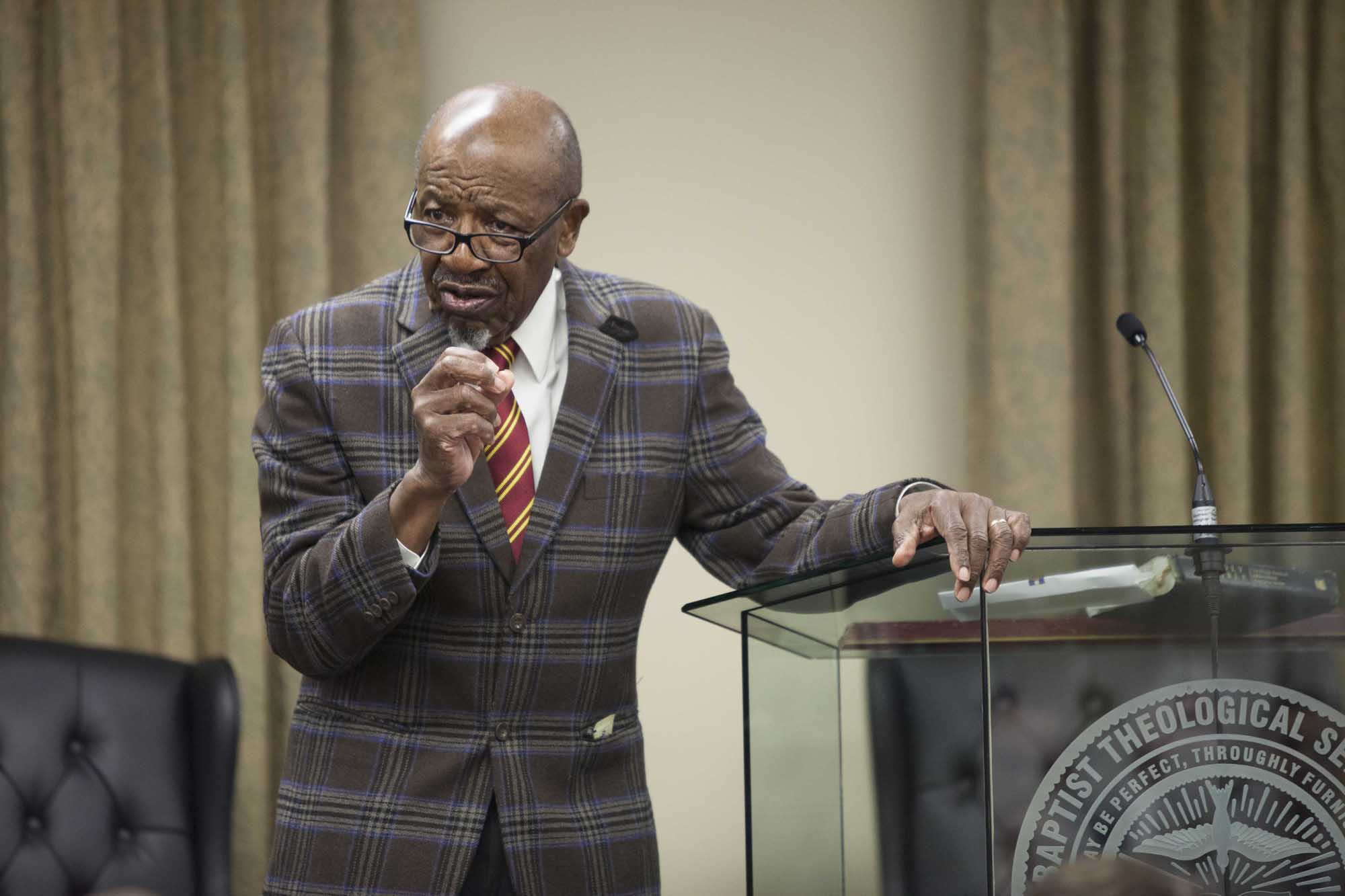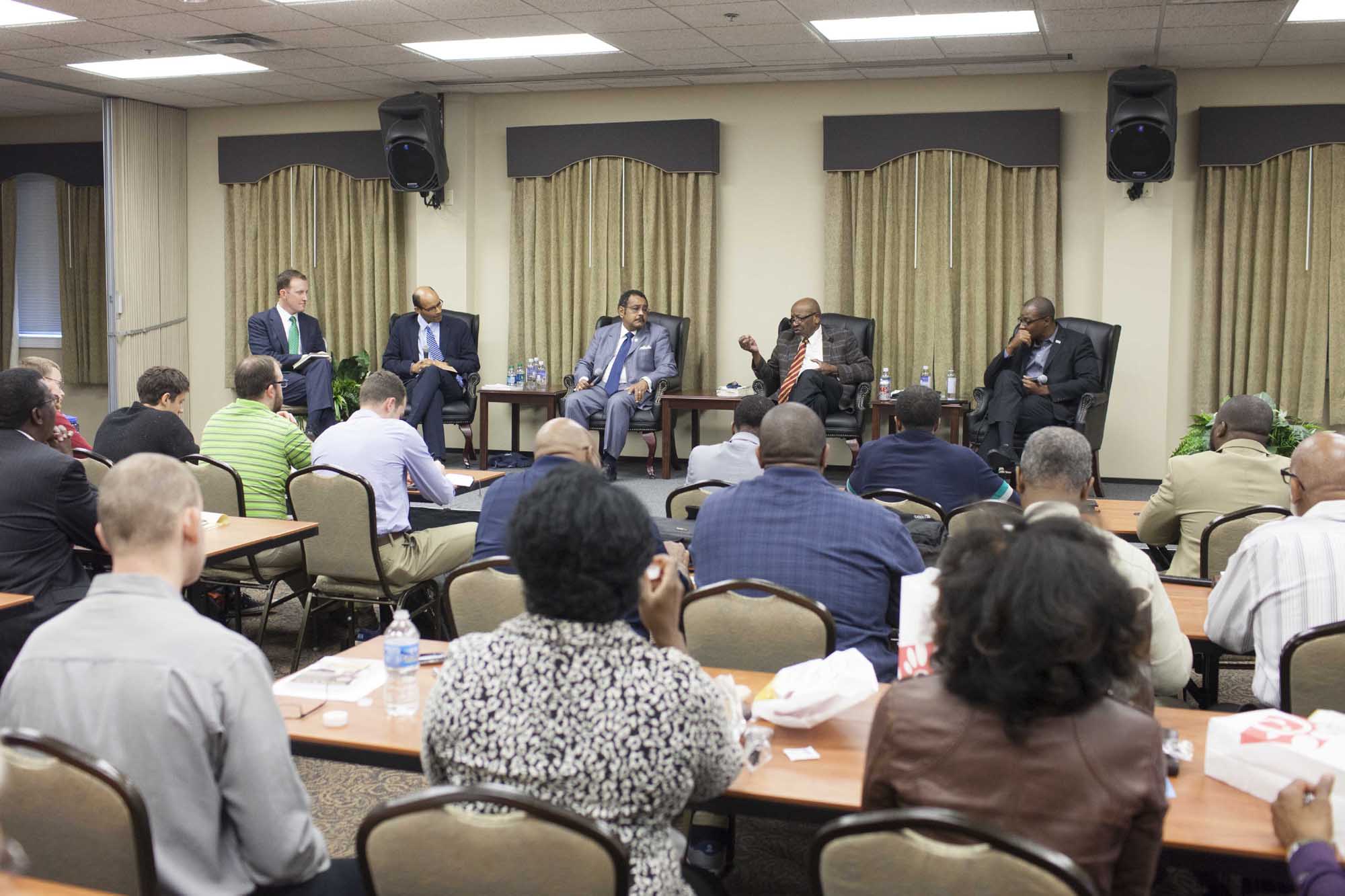
LOUISVILLE, Ky. (BP) — John M. Perkins, an 84-year-old evangelical pioneer in race relations, sees “a pivot place in history” among churches in racial reconciliation and economic justice.
 “This is the first generation of people who are beginning to understand that.” It’s a generation that “values diversity,” Perkins said at Southern Baptist Theological Seminary in this year’s Julius Brown Gay Lecture on Christian Ethics.
“This is the first generation of people who are beginning to understand that.” It’s a generation that “values diversity,” Perkins said at Southern Baptist Theological Seminary in this year’s Julius Brown Gay Lecture on Christian Ethics.
“There’s an underlying movement today that now people are wanting to do mission with people, and they want to learn from people,” Perkins said, and they see the diversity of human beings as “a value in life.”
Perkins, a Mississippi native, fled to California as a teenager when his brother was murdered by a town marshal. After he professed faith in Christ in 1957, Perkins returned with his wife and children to Mendenhall, Miss., where he established a ministry to provide both Bible training and community development programs such as health clinics, thrift stores and housing cooperatives. He is the founder and president of the John and Vera Mae Perkins Foundation.
 In 1989, Perkins was among the founders of the Christian Community Development Association to spread this philosophy of rebuilding poor neighborhoods with biblical principles. He also is the author of several books, including “Let Justice Roll Down” and “A Quiet Revolution.”
In 1989, Perkins was among the founders of the Christian Community Development Association to spread this philosophy of rebuilding poor neighborhoods with biblical principles. He also is the author of several books, including “Let Justice Roll Down” and “A Quiet Revolution.”
Southern Seminary’s Julius Brown Gay Lectures are among its most prestigious lectureships, dating back to 1895. The lectures have brought some of Christianity’s most significant figures to the seminary campus, most notably Martin Luther King Jr. in 1961. The opportunity to deliver the lecture at Southern Seminary, Perkins said, was “one of the honors of my life” in his longstanding work in biblical reconciliation.
Perkins lectured on “Theology and Race in American Christianity” to a standing room-only crowd of Southern Seminary students and African American pastors with the Kentucky Baptist Convention who attended an afternoon pastors’ conference. (See story below.)
Racial reconciliation and justice are fundamental aspects of Christ’s redemptive work, Perkins said in his Oct. 27 lecture.
Anything outside of developing a church that is intentionally multicultural is “a disgrace to the Gospel,” Perkins said. “It belittles the Gospel to have a church based on race. It’s a slap in the face of a God who created from one human being all the nations that reside upon this earth and a Gospel that its intention was to reconcile people to God and to each other.”
The solution to racial divisions, Perkins suggested, is to “come back to the Bible and totally believe it.” He emphasized the need to understand the reconciling work of Christ in the incarnation with a sense of economic justice rooted in the creation account.
“The big issue is an economic issue. Justice is how we manage the earth’s resources,” Perkins said. “There is no biblical trace that God gives us ownership. The earth is the Lord’s, and He gives it to us as a stewardship.”
On the topic of community development, Perkins said he believes “every church should have a nonprofit because it broadens your movement out into the midst of your members and other folk who might be poor,” though noting that nothing can replace the local church’s efforts in benevolent ministries.
In a panel discussion following the lecture, Perkins added to his comments that racial justice is an economic issue, noting that “all resources come from God” in creation, with mankind called to steward those resources.
“Work is the best welfare program in the world,” Perkins said. “People need more than charity. What do they need? They need a job. It provides you the greatest affirmation — you earned it.”
Perkins also shared insight into the “three R’s” of his philosophy for community development: relocation (into communities of need), reconciliation and redistribution, which he said is not spreading the wealth but in calling to biblical action those who control the means of production.
“God’s love for humanity is the motivation for redemption,” Perkins said. “It’s His love, it’s His justice, His tender care, His land from which we get the food to live.”
Joining Perkins in the panel discussion on racial reconciliation were T. Vaughn Walker, WMU Professor of Christian Ministries and professor of black church studies; Jarvis Williams, associate professor of New Testament interpretation; and Curtis Woods, the Kentucky Baptist Convention’s associate executive director for convention relations.
Walker, who became the first African American faculty member at any of the six SBC seminaries in 1986, said racial reconciliation in Southern Baptist churches today remains a difficult issue because of the changing cultural landscape.
“This is a multicultural world. If we’re still playing the black-and-white game, we’re going to be far behind where the real game is,” Walker said.
Williams, whose research in the New Testament includes a focus on Gospel-centered racial reconciliation, emphasized the importance of defining terms when discussing the issue.
“When we start talking about what’s the foundation underneath the problem of injustice, the problem of racism, I think it’s Adam’s transgression,” Williams said regarding the universal power of sin. “The greatest hope I think every single human being needs is to be transformed by the supernatural power of the bloody Gospel that focuses on a Jewish Messiah who died and resurrected for Jews and Gentiles to make them one new man in Christ.”
Woods spoke on behalf of the Kentucky Baptist Convention, which organized a conference for African American pastors following the lecture and panel discussion. (See story below.) He noted the efforts of KBC leaders to preach in a diversity of churches if they are invited to preach God’s Word.
“We believe in Gospel-centered racial reconciliation,” Woods said. “We are sincerely wanting to see the church to look like heaven before we get there.”
Audio and video of Perkins’ lecture are available at sbts.edu/resources.
*****************
Expository preaching commended
to African American pastors
LOUISVILLE, Ky. (BP) — Christ-centered expositional preaching is cross-cultural, speakers Thabiti Anyabwile, Victor Sholar, H.B. Charles and Curtis Woods noted at an African American pastors’ conference sponsored by Southern Baptist Theological Seminary.
“We want to preach in such a way that opens the understanding of our people so that their rejoicing is really in the truth,” said Anyabwile, church planting pastor at Capitol Hill Baptist Church in Washington, D.C.
Anyabwile, opening the Oct. 27 conference with a cultural and biblical defense for expositional preaching, addressed four topics: popular objections to expositional preaching in many cultural contexts; Nehemiah 8 as a biblical text that models and calls pastors to expositional preaching; the result of the ministry of expository preaching; and how expository preaching answers the objections that are often raised.
Objections, Anyabwile said, include the idea that expository preaching is culturally inappropriate or too intellectual. But expository preaching engages culture, and “all of God’s Word is for all of God’s people. And we may only enjoy God rightly when we understand His Word rightly,” he said.
Expository preaching, or true biblical preaching, is book-centered, for the people, and “true biblical preaching has not happened until the people understand the Bible,” Anyabwile said.
Expository preaching means a pastor reads and explains the text until the congregation understands it, he said.
“We get to celebrate from every text the work of Jesus Christ on our behalf in ways that are natural to the text,” he said. “So we haven’t actually expounded the text and done expository preaching until we have understood and helped our people understand how that text relates to Jesus Christ and His finished work on our behalf, because that’s how we go from weeping over our sins to rejoicing in our Savior.”
Victor Sholar, senior pastor of Main Street Baptist Church in Lexington, Ky., spoke about various elements of expository preaching and pastoral ministry. Preaching from James 3, he urged pastors to remember they are judged with a stricter judgment as teachers. He noted that “the instrument of our vocation is our tongue” as pastors. The ability or lack thereof to control one’s tongue, he said, is a good way to determine a pastoral calling.
Sholar also discussed how preaching is both doctrinal and devotional, and expository preaching challenges how pastors preach because “Christ has a holy passion about how your sermon affects people.” He said that most people want to gain more self-esteem through sermons but the pastor’s job is to esteem his sheep in Christ.
“Preaching exists solely for the glory of God,” Sholar said. “The only reason God gives a pastor favor is because He wants His Word to be heard and known.”
H.B. Charles, pastor of Shiloh Metropolitan Baptist Church in Jacksonville, Fla., then preached an expository sermon from Psalm 113. Praise is essential to worship, he said. True worship, like what the psalmist exhorts God’s people, inevitably involves praise and is always about God.
In the psalm, Charles pointed out that the call to worship appears three times in the first verse. He offered three points about worship from the psalm: worship is a universal call, Christians should worship God at all times and they should worship Him in all places.
“The believing heart finds many reasons to praise the Lord,” Charles said, encouraging pastors to remember God sits above everything and sees all things.
The pastors’ conference also featured a panel discussion with Anyabwile, Sholar, Charles and Kentucky Baptist Convention leader Curtis Woods. The panel discussed sermon preparation, influential pastors and authors, and other areas of pastoral ministry. Audio from the conference is available at sbts.edu/resources.
















